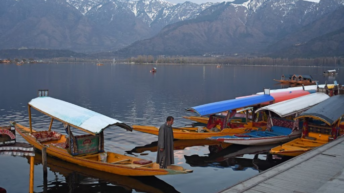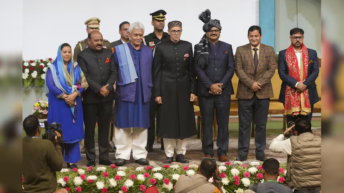|
Listen to article
Getting your Trinity Audio player ready...
|

Sri Aurobindo was one of the greatest revolutionaries and spiritual leaders of India, the first to advocate Purna Swaraj. पूर्ण (Pūrṇa) Complete, स्वराज Self -rule. He defined what real freedom was – not only from the British but also from one’s own limited body-mind-sense complex, thus inspiring in people the highest level of spiritual consciousness. The year 1893 marks a milestone in the history of India. Two great voyages had taken place. One was from India to the West and the other was from the West into India. Swami Vivekananda traveled to the United States to deliver his groundbreaking speech at the World’s Parliament of Religions, Chicago; where he introduced Hinduism, as the mother of all religions! Aurobindo returned to India after spending 14 years in England, because of the irresistible call from Mother India. In 2022 as the Nation celebrates 75 years of Independence, it also marks the 150th Birth Anniversary of Sri Aurobindo.
Early life and Education in England (1879-1893)
Born on 15 August 1872 in Kolkata, Aurobindo Ghose was admitted to Loreto Convent School, Darjeeling at the age of five. At seven, he was taken to England by his parents Krishna Dhun Ghose and Swarnalatha Devi along with his 4 siblings. He studied in Manchester, London, and Cambridge. He was a student extraordinaire!

After spending 14 years of his formative years in a foreign land he deliberately disqualified himself for the ICS examination as he had no interest in serving the British Raj. On the eve of his departure from England he wrote in his poem called ‘Envoi’:
“Me from her lotus heaven Saraswati
Has called to regions of eternal snow
And the Ganges pacing to the southern sea,
Ganges upon whose shores the flowers of Eden blow.”
He worked for the next thirteen years in the Princely State of Baroda in the service of Maharaja Sayajirao Gaekwad, and as a Professor of French and English at Maharaja’s Baroda College. Later he was appointed as the Vice Principal and then as acting Principal.
Marriage
Aurobindo Ghose got married to Mrinalini Devi on 30 April 1901 according to Hindu rites in Calcutta. Mrilanini Devi was 14 and Aurobindo was 29 at that time. Her father Bhupal Chandra Bose was an England-returned Bengali, who held a high position in the Shillong Agricultural Department. Her marriage with Aurobindo was spent mostly in separation and solitude. She transformed her suffering into austerity through her association with Sarada Mata at the Ramakrishna Ashram. She died in 1918 before she could reunite with her husband in Pondicherry, during the deadly influenza pandemic. Mrinalini Devi silently sacrificed her life for the cause her husband stood for.

Aurobindo’s Major Political leanings
For Aurobindo Mother India was not just a piece of land, she was a Shakti– a force, and Her freedom became his greatest concern. Preparing the ground for a nationwide political upsurge for Independent India became his foremost concern. When the partition of Bengal was implemented in 1905 by the then Viceroy of India – Lord Curzon, Aurobindo was called to head the National College, founded in 1906 by many patriot educationists established to provide nationalist upbringing to the youth and spark a Swadeshi Movement based on the 4 fold program of the New Nationalist Party –
The four-fold program advocated were:- “Swaraj, Swadeshi, Boycott, National Education”
- Boycott of English cloth, salt & sugar.
- Substitution of National schools for colonial government institutions
- Creation of an Arbitration tribunal
- Creation of volunteer forces
- Decisive Rejection of English as a medium
- Rejection of government posts and seats in the Legislative Council under the British administration
- Social boycott of those Indians who refused to boycott foreign goods
Aurobindo resigned from the post in 1908 to concentrate on his political action. He collaborated with Bipin Chandra Pal, one of the main architects of the Swadeshi movement, and launched the revolutionary English weekly newspaper in 1905 as its chief editorial writer. When Aurobindo was prosecuted by the British government for sedition as the editor of Bande Mataram, Rabindranath Tagore wrote a poem entitled Namaskar in which he described Sri Aurobindo as ‘the Voice Incarnate of India’s Soul’.
Rabindranath, O Aurobindo, bows to thee!
O friend, my country’s friend, O voice incarnate, free,
India’s soul!

Aurobindo found in Lokamanya Bal Gangadhar Tilak, the first leader of the Indian Independence Movement, a great collaborator and example.

For one year Aurobindo had to face trial in the Alipore Bomb Case but was eventually acquitted in 1909.
A rousing reception was given to Aurobindo by the press and people welcomed him as a Yogi and supreme leader of India. Meanwhile, Bande Mataram had closed down. He started two new publications, Karmayogin in English and Dharma in Bengali. He later went to Chandernagore and then finally reached Pondicherry on April 4, 1910
Withdrawal from Politics and Dedication to Spiritual Pursuits
In Pondicherry, after 4 years of practising Integral Yoga, Aurobindo started Arya, a 64-page monthly periodical that was published from 1914 to 1921.

His works on
- The Life Divine,
- The Synthesis of Yoga,
- Essays on The Gita,
- The Secret of The Veda,
- Hymns to the Mystic Fire,
- The Upanishads,
- The Renaissance in India,
- War and Self-determination,
- The Human Cycle,
- The Ideal of Human Unity and
- The Future Poetry
were published in this magazine.
“The Veda is thus the spiritual and psychological seed of Indian culture and the Upanishads the expression of the truth of highest spiritual knowledge and experience…Thus framed the Mahabharata and Ramayana, whether in the original Sanskrit or rewritten in the regional tongues, brought to the masses by Kathakas, – rhapsodists, reciters and exegetes, – became and remained one of the chief instruments of popular education and culture, moulded the thought, character, aesthetic and religious mind of the people and gave even to the illiterate some sufficient tincture of philosophy, ethics, social and political ideas, aesthetic emotion, poetry, fiction and romance. The Mahabharata especially is not only the story of the Bharatas, the epic of an early event which had become a national tradition but on a vast scale the epic of the soul and religious and ethical mind and social and political ideals and culture and life of India. The leading motive is the Indian idea of the Dharma.”
– Arya , May – September 1920
When Sri Aurobindo Ashram was founded and the town of Auroville was established by his soulmate and collaborator – The Mother, his followers referred to him reverently as Sri Aurobindo.

Later Savitri became his longest and greatest cosmic poem in English comprising 24,000 lines, wherein he portrayed the unfolding destiny of man and his transcendental nature. On Dec 5, 1950, Sri Aurobindo left his mortal body.


In the words of the Mother – “Sri Aurobindo came upon earth to teach this truth to men. He told them that man is only a transitional being living in a mental consciousness, but with the possibility of acquiring a new consciousness, the Truth-consciousness, and capable of living a life perfectly harmonious, good and beautiful, happy and fully conscious. During the whole of his life upon earth, Sri Aurobindo gave all his time to establish in himself this consciousness he called supramental, and to help those gathered around him to realise it.”
from Volume 12, On Education, p.116 (24 July 1951)






Add comment